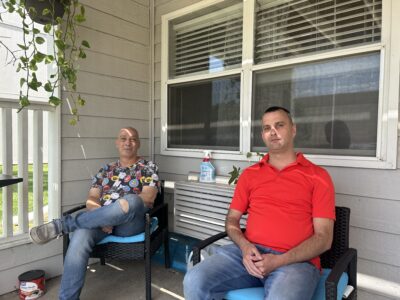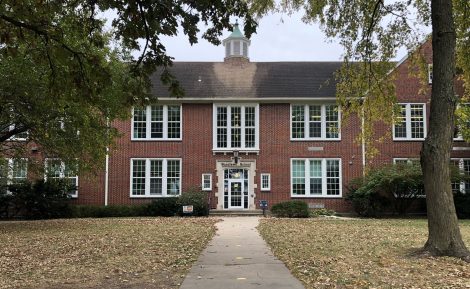When these tenants raised concerns about mold, there was little Lawrence’s rental inspection program could do

photo by: Bremen Keasey
Roy Plummer (left) and Brandon Whelan outside their apartment. The couple has said conditions inside their units at Eagle Ridge Apartments in Lawrence have been hazardous, with mold and fungi detected in their bedroom and bathroom that has caused serious problems to them and their three-year old son. Despite the conditions, the couple said their concerns have been ignored by the property managers.
Roy Plummer and his husband, Brandon Whelan, moved to Lawrence in March from Missouri, with the hope of helping Whelan continue his education at the University of Kansas and to enjoy their life in a new city.
Instead, they have landed on a path that has wound through many a Lawrence story — an apartment problem.
Plummer and Whelan told the Journal-World issues with their unit — including the presence of mold — at the Eagle Ridge Apartments has caused significant stress, detriments to their health and that of their 3-year old son and exacerbated financial issues because of medical bills and loss of work. Despite bringing up the concerns repeatedly to property managers “in a civil manner,” the couple say their concerns have been ignored.
“It’s been hell,” Whelan said.
City officials have heard a version of that story many times before, so often that in 2014 the city created a rental licensing and inspection program that is supposed to give tenants some peace of mind that the city will step in if an apartment has dangerous living conditions.
But Whelan’s and Plummer’s case is an example that the program has limitations. A big one is mold.
Treni Westcott, the city’s code compliance manager, told the Journal-World the inspection program with the city does not specifically cover mold.
Those rental inspections are “narrowly focused” to ensure the units are compliant with minimum property maintenance standards and the city’s Property Maintenance Code and Land Development Code. That often means the inspections focus more on issues like whether smoke or carbon monoxide detectors are working or whether plumbing, heating and electrical systems are in working order.
Westcott said if there was a large amount of visible mold, the city could request that the landlord take necessary actions to remedy the situation, but Westcott said it really depends on each case and the size of the area the mold may cover.
“If there is nothing visible, we cannot take any action,” Westcott said.
Even then, the city has limited options when it comes to mold. Westcott said the city does not “perform any type of mold testing nor air quality testing.”
Now Plummer and Whelan find themselves resorting to the court system to try to resolve the matter. Plummer has filed a small claims petition in Douglas County court against property manager Jennifer Wright for the issues at their apartment, at 530 Eldridge St., for $10,000 to cover doctor bills, medical appliances and detriments to their health due to the “extremely distressing and hazardous” conditions in the apartment.

photo by: Contributed
A photo of a humidifier that appears to have pink and black mold on it taken by Brandon Whelan on May 19. Whelan and his husband, Roy Plummer, have said the mold and fungi in the apartment have caused severe health issues to their family.
The Journal-World reached out to Eagle Ridge Apartments and Wright about the claims. Wright told the Journal-World she was not aware of the petition. She also said she would follow up with the apartments’ regional office. According to its website, Eagle Ridge Apartments is managed by Artisan Management Group, which is based in Iowa and manages properties across six states in the Midwest.
In the legal filing, Plummer included a timeline of events and a letter sent to the management company about the maintenance and structural issues of the unit and highlighting the health concerns faced by the family since they moved in.
Plummer said the family moved into the unit on March 10. Soon afterward, the couple told the Journal-World, their health issues got worse. Whelan said his psoriasis, a painful skin condition, was well controlled before moving. Now, it has once again flared up and gotten worse every day.
Since moving into the apartment, Plummer and their 3-year-old son both went to the doctor because of respiratory infections. Plummer said their son already had issues with RSV, which worsened soon after they moved into the apartment. Additionally, Plummer said he had an upper respiratory infection that nearly hospitalized him and forced him to miss work.
Plummer and Whelan shared with the Journal-World notes from medical providers written to the property managers expressing concerns about the housing conditions. The primary care provider for their son, Maureen Caro, wrote in May that his use of albuterol nebulizers has gone up “exponentially.” She said she strongly suspected it was because of an allergen in the home, and that getting out of the house would be the best solution.
“In my professional medical opinion, he should be able to move as soon as possible into a different living situation for his health,” Caro wrote.
Plummer said both he and Whelan normally use CPAP machines, but they have been unable to because of the mold in the apartment. He noted this in the letter to the manager’s office, where he also said that their son has developed “severe respiratory issues” and needs breathing treatments up to three times a day, and that Whelan’s psoriasis, previously “under control,” has “severely worsened.” He added that the family’s symptoms “improve when we are away from the apartment for more than an hour,” indicating a direct link to conditions inside the unit.

photo by: Bremen Keasey
More images provided by Brandon Whelan of what appears to be mold in and on the family’s humidifiers.
The couple eventually reached out to the city to inspect the apartment. The city’s rental inspection program conducts inspections throughout the year as part of the process landlords must go through to get a rental license. That inspection system doesn’t inspect every rental unit in the city on a regular basis, but a tenant can call the city to report a problem at any time, which usually triggers a city inspection.
Request a city inspection
If you suspect there is a code violation in your apartment or rental unit and have not been able to resolve the issue with your landlord, you can request a city inspection at any time. Tenants can email rentallicensing@lawrenceks.org or call city office at (785) 832-3345, according to information on city’s website.
A city inspector did come to the apartment on May 2, but the inspection quickly became a dead end on the mold front. The couple said the inspector told them he was unable to do anything because “he couldn’t tell if it was mold or not.” He did note there were two maintenance issues the landlord needed to address, but made no note about the potential mold in his report.
Westcott, the city building official, told the Journal-World if a tenant got a mold test done on their own, the city could use any report to “require further, possibly professional remediation.”
Plummer and Whelan later had their unit tested for mold by Pure Maintenance of Kansas, using a spore trap to collect a sample of the bedroom and bathroom on May 13. The results, reviewed by Southeast Environmental Microbiology Laboratories in Katy, Texas, on May 14, found elevated levels of mold in both the bedroom and bathroom including Penicillium/Aspergillus, which the report describes as “two of the most commonly found allergenic fungi in problem buildings.”
Images shared with the Journal-World by Plummer show what appears to be mold around various parts of the house, including in and on top of dehumidifiers.

photo by: Bremen Keasey
A photo taken by Brandon Whelan in his apartment near their hot water heater that shows water damage and apparent mold. Whelan said there was a water leak from the a neighboring unit, which has exacerbated health problems for the family.
Along with the presence of mold, Plummer wrote in the letter that there were two specific maintenance issues that were never fixed. Plummer claimed that the toilet was improperly installed, leaning forward and leaking water because of a misalignment. Despite that issue being noted, the problem remained unresolved.
Plummer also said their bedroom flooded due to a leak from the above unit, which compounded concerns about the air quality. Plummer alleged the water remained on the floor for over 48 hours and maintenance “failed to respond despite (their) request.” After the flooding, the closet is “contaminated with mold, mildew, mites, and damp materials,” Plummer alleged, and it produces a “persistent odor and poses significant health hazard.”
Plummer said the family had asked to terminate their lease early, but despite the circumstances, the early termination would require a buyout of either $3,500 or $2,000. Plummer said the two different figures were provided by different people. Plummer also said the family never got a move-in checklist and that they were not allowed a pre-occupancy walkthrough. Based on legal guidance, Plummer alleges “these omissions represent violations of tenant rights and basic housing requirements.”
Plummer said he and his family are just seeking a release from their lease without facing a buyout or unnecessary fees, but he has said he had not heard from the landlord about their ongoing concerns, which led to him filing a legal claim.
The couple also provided a legal form called a “14-30” to the landlord. Under Kansas law, if there is a material noncompliance by the landlord with the rental agreement or noncompliance with the agreement that is “materially affecting health and safety,” a tenant can deliver a written notice to the landlord laying out those issues to give a 30-day notice of terminating the lease; however, the lease would not be terminating if, within 14 days of getting the notice, the landlord makes a “good faith effort” to improve the breach.
Plummer said they sent the property managers the form on May 6 and had it notarized on May 9, but they heard nothing in response.
Plummer and Whelan told the Journal-World the family plans to move out from the unit in June, but has been incredibly frustrated with the situation they have experienced since moving three months ago. The two said they had heard from other tenants about other apartments that might have mold or have caused sickness. Whelan said they wanted to speak up in part to make sure this doesn’t happen again.
“This has been such a stressful period of time,” Whelan said. “We just want justice.”







